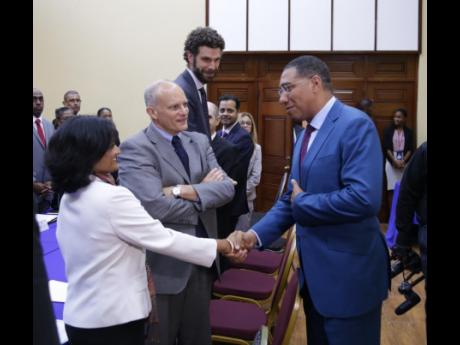Jamaica praised as IMF concludes final review - Holness pleads for consensus to tackle crime, corruption crises
Jamaica has bagged another achievement as the economy undergoes recovery and resuscitation.
The country has completed the final review of the three-year precautionary stand-by arrangement (SBA) with the International Monetary Fund (IMF).
Former Managing Director of the IMF Christine Lagarde heaped praises for the successful completion of the SBA, which followed the four-year US$932-million extended fund facility (EFF) which started back in 2013.
The SBA replaced the EFF in 2016.
“Congratulations. Congratulations for six and a half years of partnerships with us, but more importantly a successfully programme that has helped Jamaica and helped the Jamaican people. You owe it to yourself, to nobody else.
“And what you have achieved is remarkable through two programmes, two different administrations with very strong commitment and you have managed to actually create jobs, to reduce unemployment level to the lowest ever. You have reduced debt by 50 percentage points of GDP. You have managed to stabilise inflation and you have managed to accumulate reserves which will be helpful in case of another shock,” Lagarde, who has been nominated as president of the European Central Bank, said yesterday.
During a press conference at Jamaica House yesterday afternoon, Prime Minister Andrew Holness stressed that while Jamaica was happy to achieve a major milestone of ending its monitoring arrangement with the IMF, it was not the end of the nation's fiscal responsibility because the government could now no longer face the public with the rationale that tough economic decisions had to be taken because they are required by the IMF.
"My view is that fiscal responsibility is now both a culture and practice of the public service and of the political class and once we have gotten that, then I am of the view that Jamaica's fiscal future is certain," Holness said.
Lagarde, in her message, said Jamaica's achievements are primarily due to good macroeconomic policies which have been implemented.
“But they are also due to your own creativity. The way in which you have managed to involve everybody on that journey. The way in which you have used reggae to explain inflation targeting … no other country has ever done that.”
She mentioned specifically the Economic Programme Oversight Committee (EPOC), as an important body which allowed for the successes under the programme.
Between September 9-19, the IMF team, led by Dr Uma Ramakrishnan, conducted discussions on the sixth and final review of Jamaica’s financial and economic programme supported by the IMF’s precautionary SBA.
Coming out of those discussions it was announced that consideration by the IMF’s Executive Board of the review is tentatively scheduled for November 2019. Upon approval, an additional SDR 160.8 million (about US$220 million) will be made available for Jamaica, bringing the total accessible credit to about US$1.63 billion. The SBA will expire on November 8, 2019.
The IMF noted that over the last three years, Jamaica’s sustained commitment to a home-grown economic reform programme has resulted in significant dividends for the people of Jamaica. Unemployment is at an all-time low of 7.8 per cent, taxes have been reduced, business confidence is high, inflation and the external current account deficits are low, and the level of foreign currency reserves is comfortable at about US$3.5 billion.
“Budget discipline combined with a reorientation of the fiscal system, including the shift from direct to indirect taxes pioneered by this government, has helped put public debt on a sustained downward path. Proactive liability management - as evidenced by the latest successful swap of existing bonds at relatively low yield - has also helped Jamaica maintain the path towards reducing debt to 60 per cent of GDP by FY2025/26, in line with the provisions of the Fiscal Responsibility Law,” the fund noted.
But, the IMF has stressed that the government will need to address crime, support agricultural resilience, and invest in education and healthcare for the country to achieve its full potential.
It also said that the government will need to free up fiscal resources through a transformation of the public sector.
“This will necessarily entail the Jamaican society confronting tough choices, the resolution of which will require broad social consensus. More also needs to be done to build public trust in the governance of public institutions.”
Holness too acknowledged that there remain concerns around crime and violence, corruption, institutional reform, efficiency and other issues impacting the nation.
"Sometimes we don't see the crisis in these issues because we are not at the brink and we continue to survive, but in all of them that I have mentioned, Jamaica is in a crisis," he said, arguing that oversight and consensus are needed to bring things under control in those areas.
Jamaica will continue to benefit from technical advice from the IMF and their local offices will remain open for another two years.

